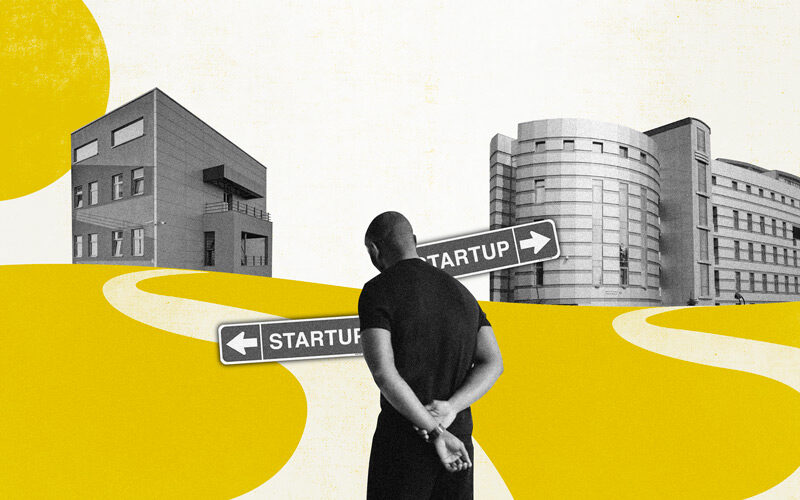The adage “two heads are better than one” applies quite nicely to startups.
Sometimes, we need someone to check our egos, question our plans, and cheer at our successes. But it takes a special kind of person to “get” you and your wild ambitions. And you’re unlikely to find this person down the local pub.
Finding a cofounder is more like dating – a prolonged, high-stakes, and sometimes fraught search for your perfect match.
Why should I co-found?
Three words: pattern, productivity, and purpose.
Pattern. Facebook started when college roomies Mark Zuckerberg and Eduardo Saverin came together to build the world’s biggest social network. Google began as a spare-time research project between Stanford pals Larry Page and Sergey Brin. The stats back up the anecdotes: 80% of the billion-dollar companies launched since 2005 have two or more cofounders. That’s a convincing pattern.
Productivity. It’s simple maths – when divided by two, work gets done in half the time. Plus, working in isolation means there’s no one to point out the flaws in your logic or steer you away from shady paths. A partner forces you to question even your most basic assumptions. Often, the good ideas stand out and the bad ones get argued away.
Purpose. There’s a reason it’s called running a startup. It’s exhausting, exhilarating, and all-consuming. It’s easy to get caught up in the stress and hype and fundraising and fame and forget your raison d’etre. Another human at your side can remind you who you are and why you started. They can also remind you when it’s time to catch up on neglected admin, get an early night, or lay off the fourth frappuccino.
Who should I cofound with?
A few things to add to the “seeking” section of your founder dating profile:
A skill set that complements, not duplicates
The right co-founder is someone who will complement your skill set and not copy it. Don’t think another pea in your pod – think a whole different kind of vegetable (an imperfect analogy, but you know what we mean).
A different working style can fill gaps while you focus your unique strengths. The same goes for personality types. It’s like having an alter ego you can call upon when needed. Contrary to belief, conflict is often caused by too much similarity rather than not enough. Find someone you don’t need to compete with.
An appetite for pressure
Vulnerability to stress is not an attribute you want to see. Likewise with poor time management. You’ll end up picking up too much slack, and an imbalanced workload is a fast track to resentment.
A healthy risk appetite
You might think a level-headed, risk-averse type will balance you out, but that’s what accountants and advisors are for. Look for passion and positivity – someone who will hop on board rather than dampen your enthusiasm.
Where do I find my cofounder?
There’s a conundrum in cofounding: is it better the devil you know?
A person you know and trust has their upsides. You’ll be familiar with their quirks. But if you know them too well, things can get messy. Friends and family members may come with expectations of special treatment, even if they don’t realise it. Close ties make it hard to have tough conversations. And you risk wrecking relationships forever.
You’ll likely have a good grasp on their weaknesses. But do you ever truly know a person before you start a business with them?
The alternative is a random stranger. You’ll get to know them through informal chats and interviews and hopefully some references from others. You’ll set expectations and put agreements in place to protect you both.
Of course there are horror stories. People are not always as they appear. But this can’t be a reason not to pair up, otherwise we’d all be alone forever.
Thankfully, there is a middle ground – someone who comes recommended via your networks. Someone you know of rather than know well makes an excellent candidate. You’ll still have to trust the people endorsing them, but it’s an added layer of insulation against a problem personality.
If you’re not encircled by swathes of loyal and trusted advisors, LinkedIn is an okay place to start. You’ll get time wasters when posting your search publicly, but if you’ve got connections in common, you should be able to get a handle on their personality, ability, and levels of trustworthiness.
There are also websites and internet forums where you can cruise for cofounders. Some – like the one from Y Combinator – require applicants to go through a rigorous screening process before being accepted onto the platform. Others like CoFoundersLab are more relaxed about who they take on board.
Then you’ve got matchmaking sites like YouNoodle and Angle.co, and internet forums like r/start-ups and Indie Hackers.
What should I beware of?
Cofounders can turn lonely endeavours into rewarding collaboration. But it’s not always rainbows and sunshine. Founders conflicts can be devastating for businesses. Harvard prof Noam Wasserman attributes 65% of startup failures to founder disharmony.
As a rule of thumb, don’t enter a partnership of any kind unless you and your business partner agree on the relative value of each party’s contribution to the venture. If you’re splitting equity 50/50, how will each of you contribute 50% of the workload? What happens if you can’t fulfil your end?
If you remain acting CEO, how will you manage the power dynamic? Does a title matter to them? Are they likely to feel undermined? What roles will you take in board or investor meetings? Are they prepared to take on “grunt work”? Are you prepared to keep it on?
If and when you bring someone on board, don’t forget your cap table. Use a simple spreadsheet or an online template to illustrate in black and white who owns what. This includes capital, common shares, preferred shares, and % ownership. You’ll update this with each round of fundraising.
Is there any other way?
Team playing is not for everyone. If you don’t like to share – which is okay – consider instead a high-level support team, an advisor, or a co-creator.
A somewhat modern concept, co-creators can be thought of as employees, allies, and benefactors that help you get off the ground in the early stages. They are not equal or permanent partners, but sit somewhere above employees. They may not get the same recognition as co-founders do, but their contributions are critical. The role will suit someone with genuine passion, a desire to help, and a healthy fear of commitment.
Cofounders, just like any new hire, will increase your workload due to training and onboarding commitments before they reduce it. You will encounter new challenges you wouldn’t face staying solo. You will also no longer have to deal with all the other challenges alone. But in starting up, it’s never a case of hard or easy. It’s a case of which hard you choose.











